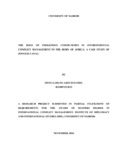| dc.description.abstract | The study examines the role of indigenous community in environmental conflict management by taking Jonglei Canal in South Sudan as a case study. The study begins by providing a background to environmental conflicts in Jonglei Canal, then reviews the methods used by the indigenous community to resolve environmental conflicts in broadly. It then specifically looks at the role of indigenous communities in environmental conflict resolution in Jonglei Canal, South Sudan and also evaluates the opportunities and challenges faced this indigenous community. The study hypothesized that 1) there is a significant relationship between the role of indigenous communities and environmental conflict resolution and 2) that the continuation of the environmental conflict in Jonglei Canal is partly attributed to weak Conflict Prevention, Management and Resolution (CPMR).
The study was conceptualized using the Dual concern model of conflict resolution and draws largely on primary data. The study results indicate that that there are indigenous rules and ways of preventing and managing the environmental conflicts with the key method being reconciliation. The community is united through cultural shows aimed at fostering intercommunity peace. Sharing of environmental resources, however, still poses a challenge as evidenced in the emergence of environmental conflicts. The study discusses this challenge relating to environmental conflicts and provides recommendations on areas of improvement in solving these conflicts in Jonglei Canal. Among the recommendations include the need to promote community resource management peace initiatives, establish youth/economic empowerment programmers including in the areas of agriculture, continued disarmament by the government of South Sudan which processes that should be done in a more humane way, respect for the rule of law and development of relevant legislation. It also calls for improved security in the community by the increasing the number of law enforcers and the need to promote public education on resource-based conflicts through awareness campaigns. | en_US |



